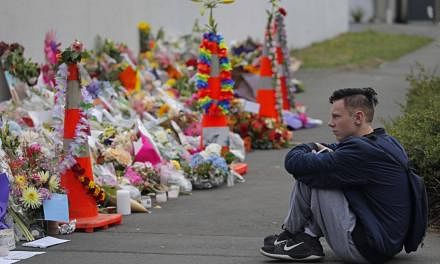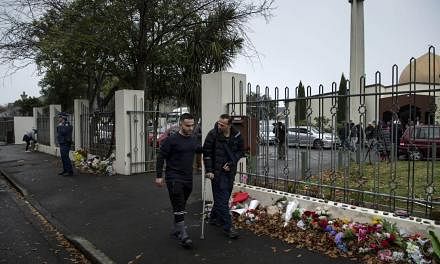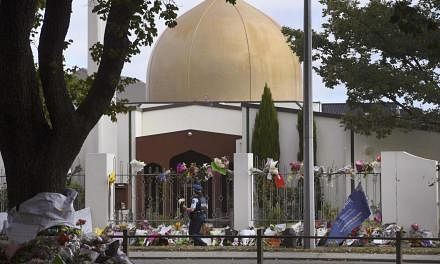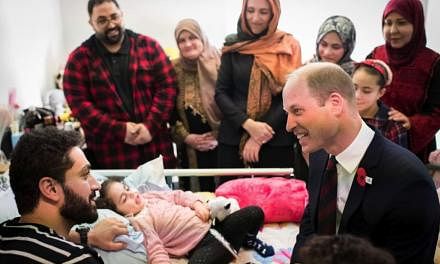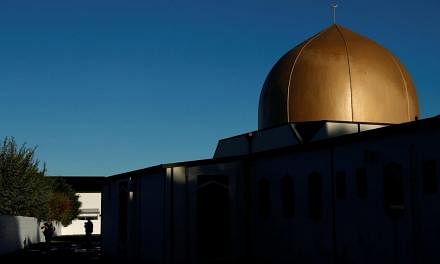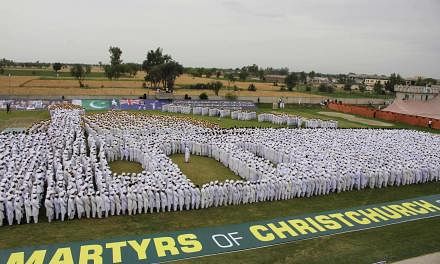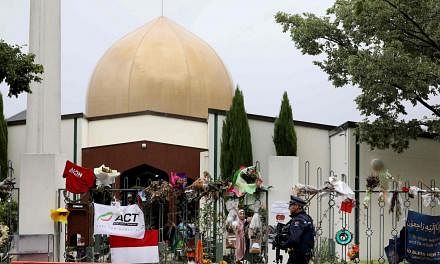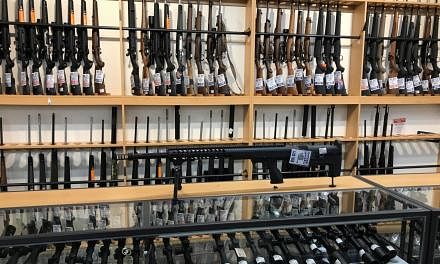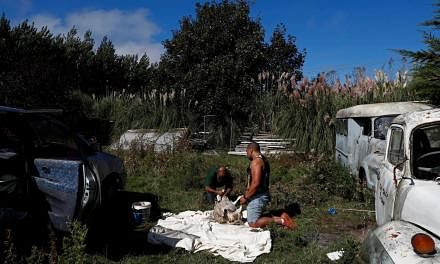CHRISTCHURCH (NYTIMES) - When the prime minister announced plans to ban semi-automatic rifles following Friday's mass shootings, it seemed to be the bold response that many New Zealanders wanted - until the country's attorney general backpedaled almost immediately and said that might not be the government's final decision.
Even after a massacre that left 50 people dead, the fight over guns and safety will be a fraught one for politicians in peaceful New Zealand, just as it is in the United States.
But there is a crucial difference between the two countries that is already apparent: While Washington struggles to take action even as such shootings become more routine, New Zealand's government is immediately diving into a detailed discussion of further legislative checks on guns.
The outright prohibition of semi-automatic weapons proposed by Prime Minister Jacinda Ardern may no longer be on the near-term table. But a Cabinet meeting called for Monday will look at a range of options, from gun buybacks to restrictions on magazines for semi-automatic rifles.
"New Zealand has to have this debate," said Alexander Gillespie, a law professor at the University of Waikato, who once predicted that the country's approach to firearms would lead to more mass shootings.
"This is a place where your car has to be registered, your dog has to be registered. But your gun doesn't."
New Zealand's relationship to firearms amounts to a sliding scale of restrictions. Gun owners need a licence but the most commonly used guns, like hunting rifles, are never registered and can be easily bought and sold.
Handguns and semi-automatic weapons require a permit to purchase and a separate licence.
The mix of freedom and regulation reflects the country's frontier history, according to experts, who note that New Zealand's link to weaponry bears a resemblance to the United States, Australia and Canada, but with a few important distinctions.
There is no right to own a gun here, as there is in the United States; rather, it is considered a privilege with responsibility.
The gun culture that has developed tends to be organised, careful and not particularly widespread. Of the 3.9 million New Zealanders of gun-licensing age, 238,000 - 6 per cent - have a firearm license, according to GunPolicy.org.
In the United States, according to a Pew study from 2017, more than 20 per cent of Americans own at least one firearm.
New Zealand has also been comfortable with the idea of restricting access to certain weapons for almost as long as the country has existed. In 1845, colonial leaders tried to stop the flow of muskets into tribal areas.
After a mass shooting in 1990, when a man killed 13 people, including two six-year-olds, after a dispute with his neighbour in the seaside town of Aramoana, New Zealand's Parliament added additional license requirements for semi-automatic weapons and handguns.
"On the whole New Zealand doesn't prohibit firearms," Gillespie said. "New Zealand reacts with regulations."
After a handful of failures to push through stronger rules over the past decade, he and others said, the question now is how far the government will try to go to further control guns.
Some gun owners argue the laws on the books are enough, and that no amount of additional legislation would have prevented Friday's massacre.
"First of all, this is insanity," said Mike Loder, a contributor to Kiwi Gun Blog. "We know why he did it. He did it in revenge for a Muslim killing people with a truck. It wasn't about guns."
Loder was referring to the shooter's own widely reported account of his radicalisation.
But compared with those in the United States, conversations about guns tend to be calmer and less ideological in New Zealand. Many New Zealanders seem eager to find some middle ground, with he latest round of arguments over the country's gun laws inevitably being shaped by countervailing forces.
On the one hand, with its current gun laws, New Zealand had one of the lowest murder rates in the world, as of a week ago. But the horrific bloodshed at the two mosques has clearly shaken what had been the country's prevailing sense of safety.
"We've lived in a utopia, but the world's caught up with us," said Chris Cahill, head of the Police Association, a union of police officers. "Our innocence is gone."
A shift may already be rippling through the country.
On Sunday morning, Raymond Healey, 49, a member of the Christchurch Pistol Club, arrived at a local shooting range, hoping to get some time firing at targets. He was greeted with a white sign, painted in red capital letters: "range closed."
Wearing olive green fleece, khaki pants and untied boots, Healey said he wasn't surprised given news of the shooting. He said the gun backlash was also to be expected.
"I can understand why people would want more restrictions," he said.
He added that he'd be willing to consider changes. "There are always improvements that could be made to the law," Healey said. "There probably are loopholes."
One of the main ones, experts say, involves how easy it is to turn a legal semi-automatic weapon into an illegal killing machine with magazines of ammunition that go beyond what is allowed.
Under New Zealand law, the most common A licence allows for the purchase of a semi-automatic rifle with a magazine containing seven bullets. An E license is needed for semi-automatics with larger magazines, and it can only be obtained through a more elaborate process of interviews and references.
But there are no restrictions on the purchase of magazines.
"Anybody can buy them without a licence," Healey said. "I thought for a long time you shouldn't be able to do that."
Ross Mason, chairman of the National Rifle Association New Zealand, which is not connected to the American NRA, also said the purchase of magazines raised issues. But he cautioned against a wider ban on semi-automatic rifles in general.
"The reason they became available here is because we were trying to eliminate deer from our forest and bush and other four-legged pests, so there was a lot of shooting of these animals from helicopters," Mason said.
"You needed to have something to fire shots very quickly."
Ardern seems to be listening, at least for now, to all sides in the debate. She also seems determined to do what the US Congress has not, which is to act.
"Our gun laws will change - now is the time," Ardern said Saturday. "People will be seeking change, and I am committed to that."

